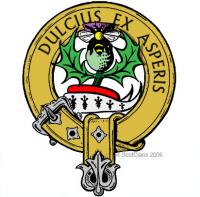
Clan Fergusson
The name Fergusson sprang to life in many, widely spread parts of Scotland. Ideally the name could be traced back so as to bring the families together to a single ancestral family, but when we consider that the name Fergus in Gaelic means ‘the angry’ and ‘the bold and proud’, we can appreciate that such a descriptive term would have been applied to someone at some time in almost every village.
The Fergussons of Argyllshire claim to be the descendants of Fergus Mór mac Erc, a Scots king from the times of Dalriada, and represent the connection with the boars head on their shield. Also making a connection with the early Scots from Ireland are the Fergussons of Dumfries and Ayrshire, such as the Earls of Carrick. They have records to link their descent to Fergus, Prince of Galloway who was founder of Dundrennan Abbey before he died in 1161.
The Kilkerran Fergussons are reckoned to have possessed their area since the 12th century. The first written record available however, is regarding John Fergusson of Kilkerran in 1464. Carrick had a great number of Fergussons by the 1600s, for whom Kilkerran was their chief.
The Atholl Fergussons were patriots, following the fated Montrose through his incredible military accomplishments in the Civil War, and again in the Jacobite risings of 1715 and 1745 they fought with their Strathhardle namesakes against the Hanovarians.
In contrast to the list of noble Fergusson soldiers all through British military history, Robert Fergusson, an Aberdeen bank clerk’s son, who was born in 1750, died on the straw floor of an Edinburgh asylum aged twenty three, and was buried in an unmarked grave.
When Robert Burns came to Edinburgh, he found Fergusson’s grave, dug out his head and held it in an embrace, for in his few years Fergusson had composed a body of poetry which Burns held as his aspirational model.
Burns was granted permission to erect a monument to the young Scots genius.









